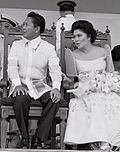Locations

Locations of houses considered "Marcos mansions" include [10] properties in Baguio, [8] in the Ilocos region where the Marcoses trace their ancestry, Leyte where Imelda Marcos's family came from, [11] and throughout the Greater Manila Area and its outskirts. [12]
Baguio properties
Among roughly 50 Marcos mansions scattered throughout the Philippines, the nine properties located in Baguio are among the most commonly covered by media reports, because of their reported opulence and because of their closeness to each other and to major tourist attractions: [2] including Mines View Park, Wright Park, and the Baguio mansion house which was constructed in the early 1900s to be the summer residence of the Philippine head of state. Four of these houses occupy roughly 5 hectares of land on Outlook Drive, just across from the mansion, and were each designated for a member of the Marcos family; the "Wigwam house compound" for Bongbong Marcos, the "Fairmont house compound for Imee Marcos, the "Hans Menzi house compound" for Irene Marcos, and a fourth house for Ferdinand Marcos's mother, Doña Josefa Edralin Marcos. [2] [8]
Located on the same road is a two-story house called the "Lualhati residence", whose title was held by Marcos crony, Jose Y. Campos, on behalf of the Marcoses. Another property, the Banaue Inn compound, is located just behind the Campos house. [2]
Metro Manila properties
Closer to the main seat of power, Marcos mansions were located in Makati, Parañaque, Manila, and San Juan. Houses were once again designated for each of the three Marcos children: a residence in Seaside subdivision, Parañaque was designated for Bongbong Marcos, [13] [2] one in Wack-Wack, Mandaluyong was designated for Imee Marcos, [2] while a house in Forbes Park, Makati, was designated for Irene Marcos. [2]
Ilocos Properties

The Ferdinand E. Marcos Presidential Center in Batac, Ilocos Norte, was the ancestral house of the Marcos family. It has served as the mausoleum of Marcos until his burial at the Libingan ng mga Bayani in Taguig, Metro Manila. [14]
Particularly notable as well is the Malacañang of the North mansion in Paoay, Ilocos Norte, which was built by the Philippine Tourism Authority (PTA) in 1977, in time for Ferdinand Marcos's 60th birthday. The Sandiganbayan anti-graft court stripped the Marcoses of the property in 2014, voiding a 1978 agreement between Marcos and the then PTA, deciding that since it is a national park, the Marcos family had no legal rights over it since national parks are "inalienable public domain". [15] Bongbong Marcos objected to the decision, saying the property was owned by the family. [16]
Eastern Visayas Properties
In Tolosa, Leyte, a muti-million dollar 42-hectare seaside resort with a 17-room mansion once called "The Malacanang of the South" was constructed in 1974, in time for the Marcoses to entertain participants of the 1974 Miss Universe beauty contest, which was being held in the Philippines that year. Located in Bgy. Olot, the property boasts a 9-hole golf course designed by Jack Nicklaus, that wraps around Mt. Inapusong. The said mountain has an old Spanish fort, which currently hosts the Shrine of the Sacred Heart. [2] [17] The property was seized by the PCGG after the 1986 EDSA Revolution in 1987. Around the late 1990s the property was being rented by an American for PhP 1,000.00 / month. [18] On December 12, 2010, the Supreme Court upheld the decision of the Sandiganbayan that voided the sequestration of the property by the PCGG. [19] The property was severely damaged by Typhoon Haiyan in 2013. [20]

In November 2023, reports came that the Olot property was being renovated by Pres. Ferdinand Marcos Jr. [21] [22]
A different mansion, in Tacloban, is noted for having been the former site of the "impoverished Quonset hut" which was Imelda Marcos's childhood home. [2] When her husband became president of the Philippines, Imelda transformed the site into a 2000 square meter mansion with a shrine to the Santo Niño and a museum, which has since been dubbed the "Santo Niño Shrine and Heritage Museum". [11] The site was less damaged by Typhoon Haiyan than the Olot mansion was, but still sustained at least PhP20 million worth of damages. The Presidential Commission on Good Government, which had sequestered the property, decided to repair the site since it had been converted to a tourist site which was a major money-earner for Leyte. [11]
Properties in other provinces
There is also what is known as the Marcos Twin Mansion built by Imelda Marcos in Bgy. Casile, Cabuyao, Laguna, on the property donated by Jose Yulo, for their 25th Wedding Anniversary. [23] Ferdinand Marcos in turn gifted Imelda with 25 gold bullions.
Ferdinand Marcos also expropriated Talaga Beach in Mariveles, Bataan for his family's exclusive use. The beach estate sequestered by the PCGG. [24] [25]
Another property in Bataan province is the 50,000 sqm Piedras Property in Bgy. Cabcabe, Mariveles which has been turned over to the Department of Agrarian Reform. [26] [27]
